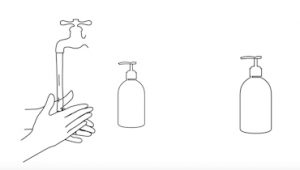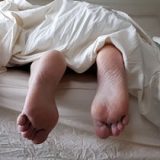A few reminders about staying healthy.
As coronavirus becomes the ‘new normal’, it’s easy to settle into unhealthy habits. Here are a few reminders about looking after your health, with links to websites which have advice.
Remember to look after your mental health
Get outside at least once a day if you can. The latest government guidance says that from 13 May we should exercise outside in the fresh air as much as possible. If you normally sit down all day, try to add some exercise into your daily routine. The NHS One You website has home workouts and tips to help you move more.
Our web page on mental health during COVID-19 has links to resources which can help with your mental health and wellbeing.
A healthy diet
The British Dietetic Association says there is no diet or food which can prevent coronavirus. Good hygiene practice remains the best means of avoiding infection.
However, eating a well-balanced diet can help ensure the normal functioning of the immune system.
If a man’s waistline is over 37 inches, he is at increased risk of health problems.
The Men’s Health Forum has published an informative toolbox talk called ‘Hazardous waist’ (887kb pdf) which you can download here. It has lots of information about healthy eating, including easy small changes which can have a big impact on your health.
Sun safety
 Whether you’re at home or on site, remember sun safety. While you are less likely to get heatstroke and dehydration in spring than in the full heat of summer, you can still burn now.
Whether you’re at home or on site, remember sun safety. While you are less likely to get heatstroke and dehydration in spring than in the full heat of summer, you can still burn now.
- Cover up and apply sunblock to skin that is exposed.
- Be especially careful between 11:00 and 15:00, when the sun is at its highest.
- Remember to drink enough water.
- If you find any new moles, or any that change shape, use the NHS ABCDE symptom checker to see if you need to get specific advice.
Hayfever
If you’re unlucky enough to suffer from hayfever, spring is time for tree pollens.
What’s the difference between hayfever and coronavirus?
Both COVD-19 and hayfever can include a headache and a cough. Both can affect your sense of smell. However,
- Hayfever will give you a runny nose, and sneezing. You eyes may be red, itchy or watery.
- Despite its name, hayfever does not give you a fever.
- Coronavirus is more likely to give you aches all over.

So if you have a fever, you are more likely to have coronavirus. The NHS 111 coronavirus symptom checker will give you more information. If you have coronavirus symptoms, you will need to self-isolate for seven days.
Treating hayfever
- Antihistamine from the pharmacist often helps.
- Try to avoid having your windows open or going outside at dawn and dusk.
- Putting Vaseline around your nose can act as a barrier.
- Sunglasses will help stop pollen from getting into your eyes.
- Avoid hanging handkerchiefs, face towels and pillows to dry outside, where they’ll pick up pollen.
See the NHS website for more information.
Cut down on smoking and drinking
The dangers of smoking and drinking are well known. The NHS offers a number of resources to help you quit smoking and to cut down on drinking.
Chapped hands

Regularly washing your hands with soap and water is the best way to kill coronavirus. If that leaves your skin feeling sore or red, use a moisturiser after you wash your hands, as well as last thing at night.
It doesn’t have to be expensive – Vaseline and aqueous cream have no smell and are available from most pharmacies. Or ask your pharmacist to recommend a good value emollient cream or ointment.
 Get enough sleep
Get enough sleep
Sleep is important for a healthy immune system. Also, diseases like diabetes and heart disease have been linked to disrupted sleep.
We have a web page with some sleep tips to help if you are not getting enough sleep.
Backache
Coronavirus has meant a lot more sitting looking at a screen at home. That can lead to backache. Lower back pain affects around one in three UK adults.
- If you’re working from home, remember your kitchen table is probably higher than your desk. Sit on an extra cushion to raise yourself until your elbows are parallel with the floor.
- Raise your screen on a couple of books, so the top of the screen is level with your eyes.
- Rest your feet flat on the floor. If necessary, use a box as a footrest.
- Get up and stretch every couple of hours. Try doing some back exercises.
- If you are watching TV or taking part in online meetings, try alternating chairs to change your sitting position.

